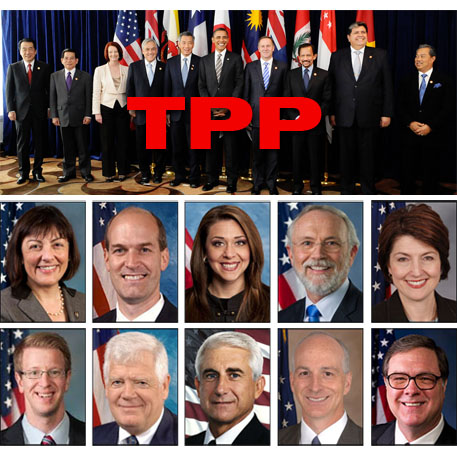OPINION
TPP offers more nice words and trickle-down promises
By LYNNE DODSON
 (Nov. 30, 2015) — Earlier this month, the Obama administration finally released the text of Trans-Pacific Partnership (TPP), the biggest trade deal the U.S. has ever negotiated, which could set the rules for about 40 percent of the global economy. Simultaneously, the White House and corporate groups launched their public-relations blitz to convince us — and Congress — that this trade deal won’t be like those other ones.
(Nov. 30, 2015) — Earlier this month, the Obama administration finally released the text of Trans-Pacific Partnership (TPP), the biggest trade deal the U.S. has ever negotiated, which could set the rules for about 40 percent of the global economy. Simultaneously, the White House and corporate groups launched their public-relations blitz to convince us — and Congress — that this trade deal won’t be like those other ones.
Even TPP proponents concede that NAFTA, CATFA, and other previous “free trade agreements” didn’t live up to their promises. Instead, as opponents predicted, these trade agreements hastened the offshoring of American jobs to countries with cheaper exploited workers. That’s why President Obama is insisting that the TPP “includes the highest labor standards of any trade deal in history.”
If that assurance sounds familiar, it should.
● “[NAFTA] is the first agreement that ever really got… any teeth in what another country had to do with its own workers and its own labor standards… There’s never been anything like this before.” — Bill Clinton, 1993
● “CAFTA has the strongest labor and environmental provisions of any trade agreement ever negotiated by the United States. CAFTA is light years ahead of NAFTA, more practical and effective than current law, and is far stronger than earlier agreements.” — Rob Portman, U.S. Trade Representative under George W. Bush, 2005
● The Peru, Colombia, and Panama agreements “have unprecedented protections for labor rights.” — Susan Schwab, trade representative under George W. Bush, 2007
● “This [Korea agreement] includes groundbreaking protections for workers’ rights.” — Barack Obama, 2010
Obama is promising the TPP will be good for workers because it includes language protecting their rights.
And he’s right. It’s in there.
But try asking Colombia labor activist Edith Santos what she thinks about the “strong labor protections” the Obama administration touted in the U.S.-Colombia agreement. You can’t, because she’s dead. Santos was murdered last year, one of more than 100 labor leaders assassinated since the Colombia trade deal was approved by Congress in 2011.
As it turns out, the U.S. trade representative said that murdering labor leaders doesn’t technically violate the agreement’s language protecting the right to form unions. Maybe that’s why Guatemala was named the “most dangerous country in the world for trade unionists” five years after signing an agreement with the U.S.
The truth is, our trading partners can and do agree to some fantastic-sounding labor standards — including some that I’d be pleased to see enacted here in America — because they know the U.S. will never enforce them. An analysis by the non-partisan Government Accountability Office found that the U.S. Trade Representative and Department of Labor “do not systemically monitor and enforce compliance with FTA labor provisions.”
The U.S. has signed 14 trade agreements with 20 countries in recent decades, but prior to 2008, the Department of Labor had not accepted a single formal trade complaint about labor abuses. Since then, the DOL has conducted investigations into a few, accepted five trade labor claims, and finally agreed in 2014 to take on its first-ever trade labor enforcement action — six years after the complaint was filed.
Nice words about labor rights do not add up to enforcement of those standards and never have. So don’t believe those familiar promises that this trade deal — the TPP — is different. It’s just more of the same trickle-down promises and false assurances for working people.
Since entering into these deals, we’ve watched U.S. trade deficits soar and millions of American jobs exported. We’ve watched America’s middle class disappear and the poor get poorer. And we’ve watched the international corporations and the extremely wealthy profit from an economy that’s increasingly out of balance.
So who are you going to believe, the president or your own eyes?
 With Rep. Rick Larsen’s support, Congress already passed “fast track” trade legislation that ties their hands on improving trade deals. They can only approve or reject the TPP. Contact Rep. Larsen and tell him to vote “no” and send negotiators back to reach a trade agreement that will lift living standards, not just corporate profits.
With Rep. Rick Larsen’s support, Congress already passed “fast track” trade legislation that ties their hands on improving trade deals. They can only approve or reject the TPP. Contact Rep. Larsen and tell him to vote “no” and send negotiators back to reach a trade agreement that will lift living standards, not just corporate profits.
Lynne Dodson is Secretary Treasurer of the Washington State Labor Council, AFL-CIO. This opinion column appeared in the (Everett) Herald on Nov. 29, 2015.





